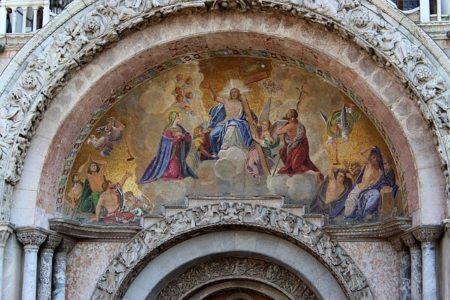I have met many people who believe they need to earn God’s favor. They are insecure about the goodness of God. They believe they need to give something up, to pay the price or suffer in some way in order to merit God’s blessings.
I also have met people whose issue is not insecurity but pride: those who feel they have paid their “dues” and are entitled to the blessing. The teaching of today’s word will address these issues. And this is the premise: God looks to our hearts, not to our works, to grant us grace. So, what does it take for anyone, regardless of their path, to experience the blessing of God, the healing and wholeness only God can provide?
To answer this, we are going to look at what happened to Jesus and what he did in the last moments of his life. Let’s read from Luke 23:33-43 (NRSV). This is the story of the crucifixion of Jesus:
When they came to the place that is called The Skull, they crucified Jesus there with the criminals, one on his right and one on his left. Then Jesus said, “Father, forgive them; for they do not know what they are doing.” And they cast lots to divide his clothing. And the people stood by, watching; but the leaders scoffed at him, saying, “He saved others; let him save himself if he is the Messiah of God, his chosen one!” The soldiers also mocked him, coming up and offering him sour wine, and saying, “If you are the King of the Jews, save yourself!” There was also an inscription over him, “This is the King of the Jews.” One of the criminals who were hanged there kept deriding him and saying, “Are you not the Messiah? Save yourself and us!” But the other rebuked him, saying, “Do you not fear God since you are under the same sentence of condemnation? And we indeed have been condemned justly, for we are getting what we deserve for our deeds, but this man has done nothing wrong.” Then he said, “Jesus, remember me when you come into your kingdom.” He replied, “Truly I tell you, today you will be with me in Paradise.”
For most of the Gospel accounts, we see the attractive side of Jesus: healing people, protecting the powerless, going after and saving the lost, feeding the hungry. In very few instances do we find Jesus struggling or in sorrow. But today we do as we recall the crucifixion. In this text, we find Jesus among criminals dying nailed to a cross after being rejected, betrayed, and despised by his enemies. Death by crucifixion represented the most shameful and worst way to die. It meant that God (or the gods) had cursed you. The place called The Skull was a place of death. The sight is that of a horror movie; worse because if you were there, you could actually smell the rotting flesh. The smell was so thick that anyone could hardly breathe.
Furthermore, just to help us get in the context of this event, consider the following. It was like going to a funeral, except that the people coming were not family and friends joining to celebrate the memory and life of a loved one.
This was a death-bed among enemies.
There were no cookies and coffee before or after, nor were you there meeting your third cousin for the first time. Instead of being surrounded by people who loved you, you were surrounded by people who cursed and despised you. And if this was not bad enough, you were not even dead yet, but you were the main attraction, expected to become the last punchline of mocking and humiliation.
It is in this context that we find Jesus’ last moments. In most artists’ conception of the crucifixion, Christ is painted as valiantly facing death, straight and committed with a glow of light all around him stronger than all others around the Cross. But this picture is not the one the Gospels paint. In the crucifixion, Jesus is weak, collapsing, tired, miserable. In the eyes of his enemies, he did not die a hero, but a criminal. In the eyes of his friends, he did not die in victory but in shame and defeat.
Sadly, if this wasn’t bad enough, most of his disciples failed at this time. He was abandoned, forsaken. Judas Iscariot betrayed him for thirty pieces of silver; Peter denied him three times with oaths and affirmations of a strong nature. The exceptions were his mother, Mary, along with a handful of disciples. She didn’t want to be there; she was witnessing her firstborn son crucified in shame and dishonor, in between thieves, but she had no choice, she was a mother and loved him as such.
However, Jesus was not weak nor was he a victim.
He freely, willingly, deliberately took the journey to the cross. It was not Judas Iscariot’s treachery, or the hate of his enemies, or the power of the Roman Empire, or Pontius Pilate who brought Jesus to the cross. What brought Jesus to be crucified before them all was his love for them, his very own enemies; he brought himself to this occasion because of his love for each one of us. He suffered our guilt, being himself innocent, dying among criminals.
And here is where the answer to our question lies. It is not found with the disciples, or even with Mary, mother of Jesus but with the thieves.
The clue for us to learn the path to healing is found among the condemned.
Let me recall, “when they came to the place that is called The Skull, they crucified Jesus there with the criminals, one on his right and one on his left.” In my opinion, paradoxically, love and grace are nowhere illustrated in Scripture as well as in this case. Our healing, love, and grace are found among the criminals. Let’s be clear, these vile men had no “good works” to rely on. They had no high standard of morality. Rather, they were wicked men; they respected neither the law of God nor the law of man. There is no way that either could say they had earned God’s favor. They were thieves, lawbreakers, arrested, tried and condemned. Their misery was immense, and they were receiving the reward of their deeds. No time for good works, for getting baptized, becoming a member of the church or anything like that, if salvation was to be attained in such a way.
However, for one of them, the time he had left was enough to mutter one of the most consequential and profound words we read in the Gospel: “Remember me.” He had a change of heart. He recognized that Jesus was, in fact, the Messiah, that he had the power to help him. (Exell, 589-591) And instead of mocking him, he rebuked the other thief and challenged him with these words: “Don’t you fear God since you are under the same sentence? We are punished justly, for we are getting what our deeds deserve. But this man has done nothing wrong.”
The thief hanging felt his guilt, but his faith was also unhesitating, full, confiding. (Exell, 589-591) The thief was changed in an instant, gained spiritual discernment on his deathbed and was able to see beyond the broken humanity of Jesus. He saw a king. And he did not ask for a favor, for blessings, even for mercy. In his misery, he dared not to ask anything, but to be remembered.
Somehow, he understood that Jesus was not a pretender, and as he looked across he saw not another dying man, but the Messiah, and decided to place his fate in him.
How can any kind of human being have such faith in such dark, hopeless and excruciating moment? Yet here we have the poorest of them all, being convicted by the Spirit of God, finally understanding in the grimmest hour the gravity of his sins, and his inability to provide for his own redemption; a humbled, broken soul. A miracle in the making.
And it is here that we see the promise of Jesus being fulfilled when he said: “Blessed are the poor in spirit, for theirs is the kingdom of heaven.” To be poor in spirit means to know our place in God’s creation. It is not about lacking, but about an honest assessment of our need for God. It is the time when we realize that we can’t make it on our own. It is the time when we are totally and completely dependent upon God. Here is a poor man.
And Jesus heard the cry of this poor soul, honoring the exercise of his faith by blessing him as he had promised and answering, “I tell you the truth, you will be with me in paradise.” The thief asked Jesus to remember him, but Jesus goes further by saying in essence, “you will be with me, you will not only be in my thoughts but in my presence. You will be home.” In the context of being mocked about his claims of saving others, Jesus extends salvation to yet another person. (Nolland, 1153)
Jesus took this broken cursed man, a thief that was dying for his crimes, straight with him to paradise. Jesus escorted a lowly sinner saved by God’s grace beyond the gates of hell and through the gates of paradise. How effortlessly can divine grace raise the vilest, rudest and worst of us by a simple request just to be remembered?
This man found what he had missed his whole life, and it was on a deathbed. He found hope where there was only death, pain, and despair. He had made choices throughout his life that pushed people away; he had already been abandoned. He was the shame of his family, yet no one had experienced what he did at that moment. This is love and grace; this is the Gospel of Jesus Christ. This is what he does for us. It is the gift only God can give, one that we can’t earn or win.
I personally have discerned that grace is what God does for us, not based on what we deserve but on what we need. This man next to Jesus is proof that none of us have to reach a certain standard or level of holiness before God accepts us as a child. That thief is proof that we don’t have to get our lives under control to merit approaching Jesus and be blessed by him. The thief on the cross is proof that salvation is by faith and grace alone, and anyone that calls on his name can be saved.
What does this mean to us?
No matter where you are right now in your life, where you are coming from, or what you have done, hope can find you.
I know the past has a way of haunting us; don’t be possessed by it. Even if you find yourself on a deathbed figuratively of literally, feeling forsaken, abandoned, doubtful, confused, or scared to death, hope will find you. And it has today. Hope will dare to go to the darkest places to find you. And it has today. If you would only open the eyes and ears of your heart, you will see hope right now standing before you with open arms. And it will suffice only to say, “remember me” to have access to all God’s goodness, love, grace, forgiveness, and hope through Jesus Christ.
This is the Gospel.
So today, would you ask to be with him? And I do not mean it as in, “rest in peace.” But to be with him as you continue to walk in this life, so your journey may lead you to paradise too. Would you ask to be remembered?
My friends, I take this Word today on the assumption that there are those of us who are seeking God, either because they have never yet found him or else because their faith is weak and they have lost assurance that they belong to God. I take this Word to those of you who also have relied on personal merits and efforts to approach God.
These are my last words as you are being convicted by the Spirit of God and considering how to respond to this invitation. In his own weakness and suffering, Jesus learned yours. He knows of your suffering; he knows of your pain; the things you can’t tell anyone else, he knows them all. Whatever is your experience right now, today, we all are offered salvation. What is there to do but to rely on Jesus’ compassion? No payment is needed, no prerequisites demanded but a humble heart. To quote Psalms 51, “a broken and contrite heart you, God, will not despise.”
Let’s place our life, our destiny in Jesus’ hands. Let’s be blessed and healed.
Don’t be forgotten, be remembered.
Works Cited
Comfort, Philip Wesley. Cornerstone Biblical Commentary. Tyndale Publishers, 2005. Print.
Exell, Joseph S. The Biblical Illustrator: St. Luke Volume 3. Grand Rapids, MI: Baker Book House, 1963. Print.
Nolland, John. World Biblical Commentary. Vol. 35c. Thomas Nelson, 1993. Print.
Nouwen, Henri. Spiritual Formation: Following the Movements of the Spirit. HarperCollins
e-books, 2010.







